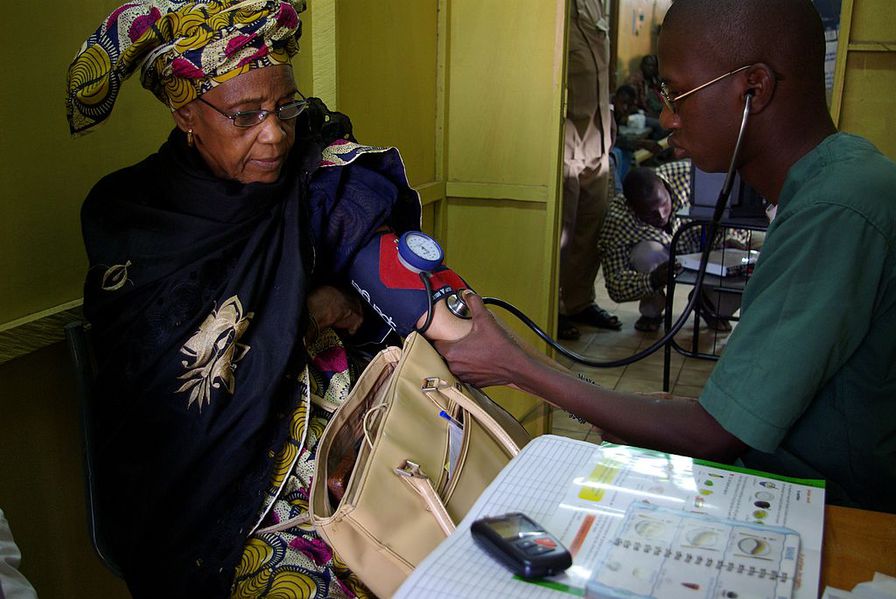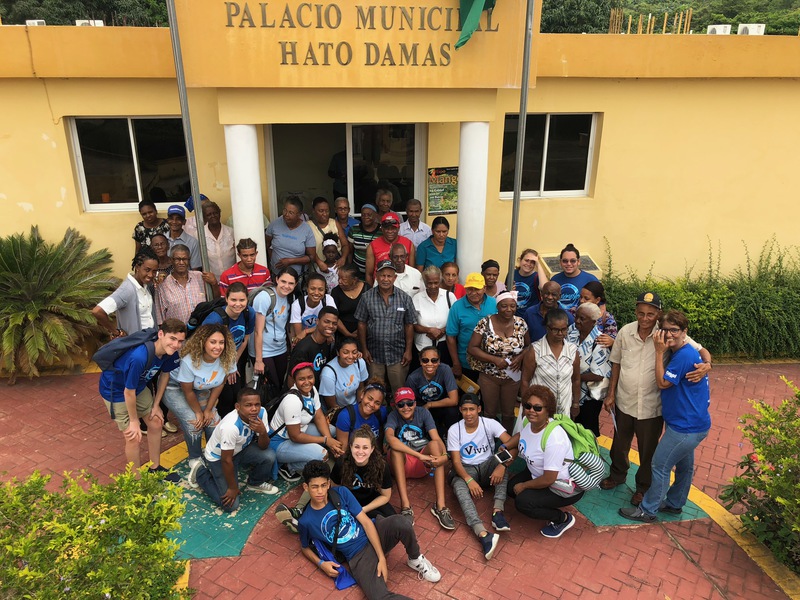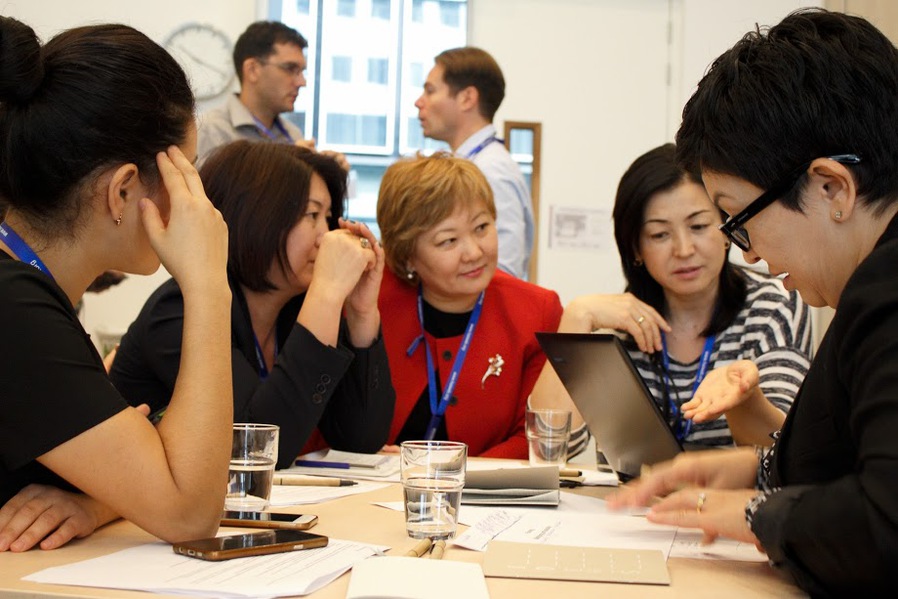F.1: Wandel ist nötig und möglich

Quelle Foto: Shutterstock / SHarms / Shutterstock Standardlizenz
Die vorangegangenen Kapitel machen deutlich, dass Diabetes mellitus gerade für ärmere Länder zu einer extremen Herausforderung geworden ist. Schätzungen der IDF gehen davon aus, dass die weltweite Diabetes-Prävalenz bis 2040 auf über 10 Prozent steigen könnte. Studien belegen, dass die Kosten medizinischer Versorgung von Menschen mit Diabetes bereits heute doppelt bis dreifach so hoch sind wie bei vergleichbaren PatientInnen ohne diese Erkrankung.
Umso wichtiger ist es auch aus entwicklungspolitischer Perspektive, dieser Dynamik etwas entgegen zu setzen. In Teilen des globalen Südens ist die Ausbreitung der Erkrankung noch ein eher junges Phänomen - umso wichtiger ist Ihr schnelles Handeln. Denn in der Verantwortung stehen auch zivilgesellschaftliche Gruppierungen aus dem globalen Norden.
Die Globalisierung von Diabetes gefährdet die Arbeitserfolge von NGOs in vielen Arbeitsbereichen. Auch um ihre eigenen Projekte weiter nachhaltig gestalten zu können, müssen Projektträger Diabetes stärker einbeziehen und die Sensibilisierung zum Thema vorantreiben, intern wie extern. Für diese Aufgaben sind wiederum neue Ressourcen notwendig. Entsprechend sollten sich finanzierende Akteure wie bspw. Stiftungen stärker engagieren. Ansonsten droht die Gefahr einer „Kannibalisierung“ zwischen wichtigen Arbeitsfeldern.
In den folgenden Modulabschnitten finden Sie Hilfestellungen, um den Herausforderungen durch Diabetes zu begegnen. Dabei ist uns bewusst, dass in der Entwicklungszusammenarbeit und humanitären Hilfe tätige MitarbeiterInnen teils sehr unterschiedliche Aufgaben erfüllen. Die anwendungsbezogenen Tipps sind idealtypisch in drei Bereiche aufgegliedert, ergänzen sich aber vielfach und können entsprechend kombiniert werden.
Einleitend zeigen wir Ihnen anhand von Fallbeispielen, wie sich lokale und internationale NGOs konkret für bessere Diagnose, Behandlung, Aufklärung und Advocacy zu Diabetes einsetzen (s.u.). Hier stellen drei Organisationen ihre Arbeit vor. Für die Abschnitte bestehen keine Frageblöcke.
Fallbeispiel 1: Santé Diabète

Quelle Foto: Wikimedia / Olivier Hébrard / Creative Commons Attribution-Share Alike 4.0 International
The NGO Santé Diabète was founded in the face of a double emergency - the lack of access to care for diabetic people in Africa and the lack of consideration of this issue by development actors. Its mission is to save lives through better prevention and management of the chronic disease. Santé Diabète is continuously working in several states: Mali, Burkina Faso, the Comoros, Senegal and France. It also supports other countries on selective occasions.
Since its creation, the organisation has focused on strengthening health systems by supporting the development of field projects in the long term, the development of research projects and by providing short-term expertise. It focuses its work on a comprehensive approach that is realized in practice by the development of six components:
- Investing in primary prevention to reduce the human and economic burden of disease progression.
- Investing in the decentralization of quality care to ensure geographic accessibility.
- Investing in the reduction of costs for this improved accessibility.
- Investing in secondary and tertiary prevention ("therapeutic education") to reduce the burden of diabetes complications.
- Investing in an integrated approach, including active involvement of patients and their families by promoting self-management mechanisms and advocacy, allowing them to defend their rights.
- Investing in research to develop innovative approaches.
These actions are implemented in the field with institutional partners so that long-term solutions for prevention policies and improved treatment can be achieved. The results have progressively made Santé Diabète a point of reference for many international organizations, medical professional societies, research centers and universities.
For a better understanding the example of the RAPIA (Rapid Assessment Protocol for Insulin Access) investigation shall be outlined. In 2004 Santé Diabète and the International Insulin Foundation conducted this investigation in Mali. It identified main barriers to the management of diabetes and found among other things that:
- there were only two specialists in three national facilities situated in the capital, Bamako;
- there was an absence of materials (like blood glucose meters or test strips) throughout the country;
- medicine for diabetes was often unavailable in the public sector, forcing patients to buy from the private sector at a higher price (in 2000, the price of a vial of insulin was €9.00 and a year’s supply of insulin for a patient about 38% of a family’s annual financial resources);
- measurement of HbA1c was available only in a private laboratory in the capital of Bamako at a very high price (€15 per test, or almost 30% of the average wage);
- no specific programs to prevent diabetes risk factors, nor therapeutic patient education were in place and there was an absence of patient representation by strong associations.
In response, Santé Diabète in close collaboration with the Malian Ministry of Health developed a strong program.
First, to strengthen human resources. Selected doctors from different regions were included in a round of continuing medical education to first of all improve the management of uncomplicated diabetes and to enhance screening capabilities and the management of diabetic foot, gestational diabetes and type 1 diabetes. In primary care facilities, health professionals were trained in recognising the symptoms of diabetes and how to screen for it. To continue the training system two specialist qualifications were created. This work has allowed more than 500 health-care professionals to be trained and 31 diabetes consultation sites to be opened in the different regions, taking on more than 15 000 patients. This approach also allowed training for 30 specialists, some of whom are practicing in a new endocrinology and diabetology service at the National Hospital of Mali, which includes a subunit dedicated to type 1 diabetes that supports more than 500 children and adolescents with diabetes.
Second, to increase access to medicine. Working with public procurement has made Glibenclamide, Metformin, insulin, and syringes available in public facilities at tertiary and secondary levels of the health-care system. National and international negotiations have led to a 48% drop in the price of insulin (from €10 per bottle to a little over €5) and an average drop in the price of oral antidiabetic drugs by 10 times (from €5 to less than €0.50).
Third, to improve technical facilities and the ability to carry out biological assessments, technical materials have been supplied at the health structures with doctors trained through the Ministry. A management system for consumables, necessary for the use of these devices, was organised with health authorities to ensure the durability and sustainability of the system.
Fourth, to develop prevention and therapeutic education programs, specific tools (like booklets and tool boxes) were developed, taking into account the specific characteristics of the local context. These instruments adapted to the Malian context have allowed health-care staff to set up diabetes education in health-care facilities. It has also helped them develop broad preventive actions in the media and the community to raise awareness about diet and physical activity.
Fifth, to strengthen health-care system governance. A large project was done with the Ministry of Health to adopt all necessary policy documents, as well as with patient associations to create local associations and a national umbrella organisation.
Fallbeispiel 2: AYUDA

Quelle Foto: AYUDA / Nutzungserlaubnis erteilt
AYUDA (American Youth Understandig Diabetes Abroad, Inc.) is a non-profit volunteer-based organization that aims at empowering diabetes communities around the world. For that, the NGO uses a peer leadership model where volunteers get selected from a pool of high school, university and graduate students. Over the past 20 years, AYUDA has trained over 650 people who have served in over 20 countries, for example Ecuador and Haiti.
AYUDA promotes a culturally sensitive and sustainable approach to support local diabetes communities in the Global South. Currently two volunteer programs are offered, based in the Dominican Republic´s capital, Santo Domingo. The organization’s work is built on five pillars:
1. Local Partnerships: AYUDA’s commitment to connect with a local partner in each country allows responding to locally defined needs. By working with the local community, culturally-appropriate approaches can be designed to empower young people, so they can live happier and healthier lives with diabetes. The local partner also provides year-round diabetes education in the local community, so that sustainability in diabetes management is secured.
2. Local Projects: AYUDA supports locally defined diabetes projects that include diabetes camps, workshops, parent support groups, and leadership training activities, among others.
3. Leadership Training: To encourage long-term involvement and professional development of its volunteers, the organization provides leadership positions for experienced volunteers to increase volunteer retention and integrate volunteers into the program planning process.
Prior to volunteering abroad, AYUDA’s volunteers participate in the semester-long AYUDA Volunteer Training Program. In the host country, the volunteer team joins with youth leaders from the local partner’s organization to foster leadership and team-building and to prepare for the subsequent outreach and camp programs.
4. Diabetes Outreach: Local youth leaders and AYUDA volunteers travel to various rural and high-need areas in the host country to observe the situation, gain information from the diabetes community, and fulfil further objectives as defined by the local partner.
5. Program Sustainability: To produce sustainable programs in the communities where AYUDA works, volunteer earned income and utilizing in-kind donations of medical supplies for the local partners are used as instruments. Also the creation of partnerships and linkages with organizations and companies that promote and sustain program are forged.
The majority of AYUDA´s financing stems from fundraising initiatives of its volunteers and from donations of small family foundations. The organization has its seat in Arlington, Virginia.
Fallbeispiel 3: HAI

Quelle Foto: HAI / Nutzungserlaubnis erteilt
Health Action International (HAI) is an NGO dedicated to strengthening medicines policy to improve people’s health. Its staff and global network of members and partners in 70 countries share information and expertise to solve medicines access and use problems. The organisation is non-profit, independent and financed by project funding. HAI is based in Amsterdam, with an office in Brussels.
HAI’s Addressing the Challenge and Constraints of Insulin Sources and Supply (ACCISS) Study was launched in 2015. ACCISS is a comprehensive global study which looks into the causes of poor insulin access, particularly in the world’s most underserved regions. It was designed to help answer some basic questions. Despite being a life-saving medicine which was discovered nearly 100 years ago, an estimated half of those in need around the world still have issues accessing insulin: Why and what needs to be done to improve this?
ACCISS started by identifying barriers to insulin access. For example, it was found there are probably only around 10 independent insulin manufacturers in the world. Furthermore, patents on most insulins had either already expired or were nearly expired, therefore this factor was not a key issue to insulin access. The evidence collected also illustrated the reality of insulin affordability for those on low wages. Data collected in 13 countries found that not only were insulin prices high, but highly variable from country to country. To demonstrate the impact of high prices, they were put into the context of affordability. The findings were staggering—all of the insulins were unaffordable.
These results along with other evidence collected have successfully been used to open the eyes of policy-makers and other stakeholders. For example, in 2017, ACCISS submitted a briefing document to the World Health Organization (WHO) Expert Committee on Selection and Use of Essential Medicines. The committee was considering to add long-acting analogue insulin to the WHO Model List of Essential Medicines. The document provided much needed evidence on price differentials between human and analogue insulins, and the negative impact the proposal would likely have on national expenditure on insulins.
But evidence is not enough; solutions are needed. So ACCISS developed interventions to improve the situation. These will be piloted in several countries, aided by the use of an online toolkit. The toolkit contains analyses of the use and value of human and analogue insulins, a tool to estimate the cost of managing diabetes, advocacy & communication guides, and much more. It can be accessed on http://accisstoolkit.haiweb.org.
Advocacy around diabetes can be daunting from time to time because the disease itself is such a large topic. Success factors for the ACCISS Study have been focusing on one issue (access to insulin), looking at the problem from various angles to identify causes, proposing solutions and, most importantly, to base all advocacy on solid evidence. Key lessons for diabetes advocacy could be summarised as:
- Try to keep it simple and stay consistent with terminology
- Find common ground in other chronic conditions which are facing similar issues
- Use the evidence to advocate for change
- Let those who are living with, or most affected by, diabetes tell their stories